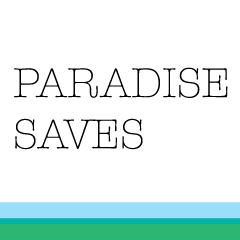It’s fitting in a way that my very first post for Paradise Saves would publish while our world is in the midst of one of the greatest financial and health disasters of our time. Interestingly, the catalyst for my decision to actively pursue financial independence occurred in the midst of the last devastating financial crisis: The Great Recession. It was after hitting what felt like rock bottom that I realized there must be a better way to live. I resolved in 2009 to do everything in my power to become my own financial hero. Based on my experiences (and many mistakes along the way), I feel somewhat qualified to provide some ideas on how someone can move forward, survive, and eventually thrive during these difficult times.
Here are my highly caveated thoughts based on my own experiences living struggling through the Great Recession (2008-2010).
I say “highly caveated” because I am not a financial professional. This is not investment advice. Go and speak with someone who is smarter than me like a CPA or a financial planner (who is a fiduciary).
But again, here are some things you can do right now to help get through these tough times (if you’re reading this sometime after 2020, the COVID-19 pandemic may be a memory).
(In no particular order)
Transfer Any High Interest Debt to a 0% APR Credit Card
I am NOT advocating to maintain debt. I’m suggesting you can save on the interest that you’re accruing on your debt while making a dent in it, at least while you get through these uncertain times. Why pay 15-20% APR when you can at least for a year pay 0%?
My favorite 0% interest card is the Chase Slate card. As of this writing, they are running a promo that features 0% APR on all balance transfers and purchases fro 15 months. After that, the variable APR will jump to 14.78%+ so be sure to make yourself a monthly plan/strategy to have your debt paid off within the 15 months. Even with an upfront fee of 5% on the amount you are transferring, you will still save hundreds of dollars (if not more) in fees. EVEN BETTER: As of 4/5/20, Chase is offering a special introductory fee of $0 for balance transfers during the first 60 days your account is open! After that, the fee for future balance transfers is 5% of the amount transferred, with a minimum of $5. This is an amazing offer, especially considering that this card has no annual fee. Seriously, guys, if you have credit card debt, this is a great card. I’ve used this card twice in my life to pay off high interest debt (between 2007-2010) and it’s a life saver.
Again, you need be disciplined and have a plan to have it all paid off before the interest rate goes up (or be ready to try and transfer to another 0% card).
And do not incur more credit card debt while you’re paying it off!
Reduce The Cost of Your Recurring Bills
We hear about cutting out avocado toast and lattes. But look at the big stuff that’s really eating away at your budget: your mobile phone bills, insurance premiums (car, health, life, etc), mortgage interest, etc.
Some simple shopping around for these items is a painless way to trim your budget without affecting your lifestyle.
In 2019, I was able to save $45/month by switching from AT&T to T-Mobile (and now have unlimited data and a really cheap Netflix membership) and now save over $450/year on my car insurance by switching from Liberty Mutual to Geico.
We also refinanced our mortgage last year to a 15-year mortgage with a low interest rate which will save us over $180,000 over the life of the loan. Now is a great time to refinance your home or condo, but since everyone is doing it start the process now!
Open a High Yield Savings Account
The unfortunate byproduct of the Fed’s continuous lowering of interest rates is that the APY for most bank and credit union savings accounts is virtually 0%. I think my savings accounts at my credit union are earning around .03%
Some select online banks (FDIC insured) are offering interest rates on savings accounts that are at least 10x that rate. I currently have a High Yield Savings Account at American Express that is earning 1.60% APR. While it’s certainly less than your rate of return on a Money Market or Index Fund, I want the stability and accessibility of having my emergency fund in savings account. Some other great online banks to check out with favorable rates are: CIT Bank, and Marcus by Goldman Sachs. Just be sure to read all the fine print. Some banks require high minimum balances or have fees attached. And be sure you understand how often you can transfer from your high yield savings account to your checking account and vice versa. Honestly, having a high yield savings account that you can regularly contribute to is the easiest way to allow your emergency fund to work harder.
And speaking of emergency funds…
Start an Emergency Fund Now if you don’t already have one
Even if you can only contribute $10 a week or month, you NEED one.
The goal is to have at least 3-6 months (or more) saved in a high yield savings account (see above) so you have cash that’s earning as much interest as possible but is readily accessible. I have six months saved but I’m aiming to get to 12 months now.
The point of the emergency fund isn’t to make money, though. It’s security. You need access to cash in times like these. Start small but automate those contributions. It will add up before you know it.
If you have an Emergency Fund, BRAVO! Now keep adding to it!
And if it’s not in a high yield savings account, move it over to one.
Ways to find money for your emergency fund:
- Calculate the amount of interest you are saving by transferring your high interest credit card debt to a 0% card and redirect it to your high yield savings account
- Find a way to reduce your recurring expenses and try and redirect at least part of what you’re saving into your high yield interest savings account.
- Consider temporarily redirecting funds that contribute each month to a retirement or mutual fund into your high yield savings account. We don’t know how long this madness will last.
And speaking of retirement funds…
Consider TEMPORARILY Halting Your Retirement Contributions
If you’re in a bind (or are even anticipating financial hardship in the months to come), consider suspending your retirement contributions and directing those funds into an emergency fund. This is NOT a long term solution but will give you security in the short term and hopefully help you avoid incurring more debt. BUT FOR THE LOVE OF GOD DO NOT CASH OUT YOUR RETIREMENT FUND!
Ok, I know that the new CARES act that Congress passed is giving a temporary reprieve from the 10% early withdrawal penalty on early withdrawal from 401k and Traditional IRA accounts. But please read the fine print (I personally don’t know all of the ins and outs of this but have heard that you need to prove you have had coronavirus, or had an immediate family member who did, or suffered financial hardship as a direct result of the pandemic) and only pull the trigger if you absolutely need to. Your future self will thank you for it.
Cut one (or more) of your Recurring or Monthly Memberships or Subscriptions
(I’m looking at you Kindle Unlimited)
Even $10 a month in savings will help. Do this today.
That being said, don’t cut all of the joy out of your life. If you’re actively using a membership or enjoying a couple of meals out each week, keep it up. These are tough times and we all need our treats too.
Resist the Urge to Cash Out Your Investments
While there is tremendous volatility and economic hardship right now, if you can stomach the dips, this is actually a great time to invest. I personally have put more than usual in my Vanguard index fund to take advantage of the “stock sale” that is happening now. But only do it – I repeat – ONLY DO IT if you 1) have your emergency fund shored up and 2) have moved any high interest debt into a 0% or low interest fund. Keep in mind that any money you put into the stock market should be funds you don’t need to access for at least the next 5-10 years. If you are worried about needing it sooner, put it in your high yield savings account.
Sorry for the long first ever post! Hopefully it was a helpful read. I’ll try and post new articles in the days and weeks ahead. Stay safe everyone. I wish you well on your health and financial journey ahead.
* Back then, I thought it would be really cool to start a business after going through a divorce and while having a gigantic mortgage on a home that I owned with a family member (who had no interest in selling it). Then I got pregnant. Good times!

